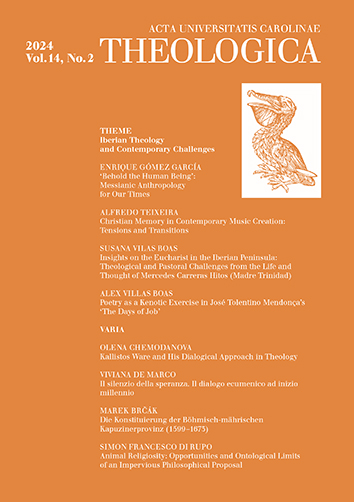AUC Theologica is a peer-reviewed journal for theology published twice a year. As we publish original papers in English, German, French, and Italian, our mission is to serve as a platform both for Czech researchers, who can present their research results in these languages, and for international contributors, who are invited to enter the academic theological discussion in the heart of Europe.
The journal focuses on a wide range of theological disciplines, such as systematic theology, biblical studies, patristic studies, pastoral and spiritual theology, religious education, church history, etc. Within these fields, the journal seeks to reflect the current theological questions and problems, which often requires interdisciplinary approaches. Supporting the intersection of various theological disciplines, we thus also welcome theological papers touching other academic fields including philosophy, sociology, literary studies, and science.
Each issue consists of two sections. The thematic section presents papers of the same focus. The section called ‘Varia’ invites papers dealing with various theological themes from the perspective of all Christian traditions. Our current and past issues are approachable for free on this website in the form of Open Access.
AUC THEOLOGICA, Vol 10 No 2 (2020), 69–91
Frater cordis mei: Friendship in Augustine’s Confessions
Lenka Karfíková
DOI: https://doi.org/10.14712/23363398.2020.59
published online: 02. 02. 2021
abstract
In Augustine’s Confessions, friendship not only has two forms, an individual and a communitarian one, but it also has two faces, a positive and a negative one. On the one hand, we find philosophical friendship which loves gratis (i.e. without thinking about any profit) and shares the common effort in search for wisdom. As Augustine puts it, such a friendship is based on a community of souls ascending to God. In his eyes, to love one’s friend ‘in God’ is even a necessary element of a true friendship. Besides an individual form of friendship, we also meet a broader community of friends in Augustine’s Confessions who even plan a common life devoted to philosophical leisure and later to religious service. On the other hand, both individual and communitarian forms of friendship also have their negative sides. Friendship is not necessarily a common search for wisdom, it can also become a substitute for such an effort. Even more harmful is the impact of what Augustine calls the ‘unfriendly friendship’ which makes ‘shame not to be shameless.’ We meet this behaviour in a group, even in a mob, several times in Confessions and find Augustine playing the role of both the seduced and the seducer.
keywords: Augustine; Confessions; Friendship; Early Christian thinking

Frater cordis mei: Friendship in Augustine’s Confessions is licensed under a Creative Commons Attribution 4.0 International License.
148 x 210 mm
periodicity: 2 x per year
print price: 100 czk
ISSN: 1804-5588
E-ISSN: 2336-3398
